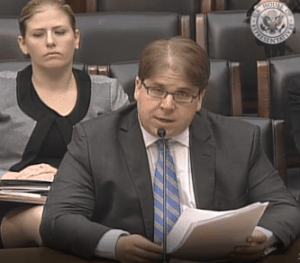 On the very day Title III / Reg CF crowdfunding kicks off in the United States, Jeff Lynn, CEO and co-founder of Seedrs – a leading UK based investment crowdfunding platform, called the securities exemption unworkable.
On the very day Title III / Reg CF crowdfunding kicks off in the United States, Jeff Lynn, CEO and co-founder of Seedrs – a leading UK based investment crowdfunding platform, called the securities exemption unworkable.
Seedrs has previously stated its intent to expand into the United States and has acquired a small platform to facilitate their move. This is the first time Lynn has messaged they would only operate as a Title II accredited crowdfunding platform – at least until Reg CF rules are updated to make them more amenable. The UK is widely viewed as the most robust investment crowdfunding market due to the approach by the FCA (the regulatory body that oversees securities markets) and support of elected officials.
Currently, there is a bill labeled the “Fix Crowdfunding Act” circulating on Capitol Hill. This legislation would address most of Lynn’s concerns while improving investor protection. There remains a chance that both the House and Senate will combine to help get the bill to President Obama’s desk before the end of this year.
 Lynn is a US-educated securities attorney who founded one of the first investment crowdfunding platforms in Europe. To date Seedrs has raised over £100 for SMEs. Lynn has previously testified before Congress sharing his experience in the UK. His opinion on Title III has been shared by some others within the industry.
Lynn is a US-educated securities attorney who founded one of the first investment crowdfunding platforms in Europe. To date Seedrs has raised over £100 for SMEs. Lynn has previously testified before Congress sharing his experience in the UK. His opinion on Title III has been shared by some others within the industry.
Lynn’s statement, in its entirety, is published below.
“Title III of the JOBS Act, which comes into force today, should have been one of the most important pieces of legislation to impact US fintech in recent years. But although Title III nominally makes it possible for non-accredited (regular) investors to invest in startup businesses and private firms in the US, the legislation’s considerable limitations and poor drafting means we believe it is simply not workable in its current form. Among other things, Title III:
- Makes it likely that only lower-quality investment opportunities will use equity crowdfunding in the U.S. Title III places such significant burdens on companies seeking to raise capital—making crowdfunding far more expensive, time-consuming and difficult than raising money through other channels (such as institutional or private angel investors)—that businesses will only to turn to crowdfunding as a last resort after more efficient capital-raising methods have failed. The result will be that ordinary retail investors will have access only to those businesses that cannot raise capital elsewhere, which is an adverse selection phenomenon that has not occurred in Europe.
- Gives insufficient protection given to investors. While Title III and the related regulations place significant focus on limiting the losses that may be experienced by investors, loss of capital is not the only risk in this asset class. Also important is that investors be protected in the case of a business’s success: a successful business can see its valuation increase 100-fold or more, but if the investment has not been properly structured or monitored, investors may receive nothing. Where restrictions interfere with crowdfunding platforms’ ability to provide those protections—which is precisely what Title III does—investors will be significantly worse off in the long run.
- Reduces the likelihood of businesses succeeding raising capital. One of the key lessons from the growth of equity crowdfunding in Europe is that raising capital in this way is a dynamic process that requires the business to build momentum behind its campaign. Successful crowdfunding campaigns tend to require active outreach, ongoing and multi-modal engagement with prospective investors, and the participation of one or more “anchor” angel or institutional investors, all before the crowd investors start to commit capital in a meaningful way. Title III’s significant marketing restrictions mean that companies will be very limited in their ability to create momentum, which in turn will make it exceptionally difficult for their campaigns to succeed.
“What is particularly unfortunate in all this is that Europe, and the UK in particular, has shown how a regulatory system can facilitate a thriving equity crowdfunding environment, allowing the best companies to raise funds successfully and giving investors the protections they need. US lawmakers would have been well advised to look much more closely at the UK system when developing Title III.
“However, I am hopeful about the future of Title III, and under revised legislation (a version of which is already being considered by Congress), I would love for Seedrs to use it to facilitate investments in the US.
“In the interim, Seedrs will launch stateside under Title II of the JOBS Act, which is limited to accredited investors, and which will offer a specific demographic of investor access to many of the European businesses seeking capital on our platform. Whilst it means that entrepreneurs will only have access to a portion of the American crowd, the opportunity for those investors who are accredited is really exciting. We believe Europe has the fastest-growing ecosystem of early-stage businesses in the world, and the combination of reasonable valuations and fast growth that many companies see on this side of the pond should make them highly appealing investment opportunities for accredited American investors.”

